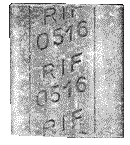Museum,
author at odds over whether Nazis made
soap from corpses Picture
added by this website ATLANTA, Georgia (AP) --
The U.S. Holocaust Museum
has barred a book signing by the nephew of
an Auschwitz inmate who suggests Nazis
made soap out of the bodies of Jews who
died in concentration camps. In a memoir published this spring,
Ben Hirsch wrote that while at
Auschwitz, his uncle was forced to make
soap and that human corpses were used as a
raw material.  Hirsch,
whose parents and two siblings died in the
camps, also was among a group of people
who buried four bars of soap at an Atlanta
cemetery's Holocaust memorial in 1970,
believing the soap was made from human
fat. Hirsch,
whose parents and two siblings died in the
camps, also was among a group of people
who buried four bars of soap at an Atlanta
cemetery's Holocaust memorial in 1970,
believing the soap was made from human
fat.
But many historians say the Nazis never
used their victims to make soap, and the
United States Holocaust Memorial Museum
refuses to endorse any book that argues
otherwise. Hirsch, an Atlanta architect, had
planned a signing of his book
"Hearing a
Different Drummer" at the
Washington museum in November, but museum
officials said allowing him to do so would
be interpreted as sanctioning his views,
The Atlanta Journal-Constitution
reported Monday. "(Hirsch) was advocating that we
explore what is essentially a dead end,"
Peter Black, the museum's chief
historian, told the newspaper. Museums representatives did not
immediately respond to calls by The
Associated Press for additional comment
Monday. The four bars of soap, stamped "RIF,"
were found by a Jewish soldier who was
part of a U.S. force that liberated a
concentration camp at the end of World War
II. Historians say the initials stand for
the German translation of "Reich
industrial fat." But at the time the bars
were found, the "I" was widely interpreted
as a "J" and the initials were interpreted
as standing for the German translation of
"pure Jewish fat." The soldier's
wife found the soap bars in their
basement in 1970 and the couple called
a rabbi, who arranged the burial at
Atlanta's Greenwood Cemetery. The bars
remain buried there. "There's a religious issue here,"
Hirsch said. "These are not just soap.
They were buried as if they were human
beings." Hirsch says his brother was told by
their uncle, who died in the 1950s, that
the Nazis used human corpses to make
soap. Hirsch's memoir, most of which is
devoted to his experience as a U.S.
soldier in post-World War II Germany,
remains on the shelves of the museum's
bookstore. The museum distributes a fact sheet
saying the contention that Nazis used
human corpses for soap is a rumor that has
never been substantiated. "This one soap story keeps rolling
around," said Deborah Lipstadt, an
Emory University history professor who
recently prevailed against
a libel suit by a British scholar whom
she accused of denying the Nazis
slaughtered millions of Jews. "Soap became
sort of a metaphor -- they killed them and
made soap out of them -- to show how
horrible the Nazis were." "I wouldn't say (the Nazis) never did
it," she said. "I would leave the door
slightly cracked." ©
Copyright 2000 The Associated
PressRelated story on this website:  Holocaust
expert rejects charge that Nazis made
soap from Jews
Holocaust
expert rejects charge that Nazis made
soap from Jews Bizarre burial
prods Holocaust angst
Bizarre burial
prods Holocaust angst Nizkor
on the soap allegations
Nizkor
on the soap allegations Holocaust
museum, author at odds
Holocaust
museum, author at odds Documents
on the allegation about lampshades made
from human skin
Documents
on the allegation about lampshades made
from human skin
|